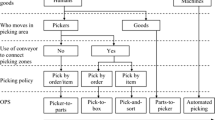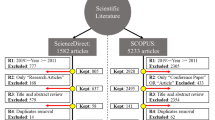Abstract
The production system of a wafer fabrication factory is a very complicated process. Job scheduling in a wafer fabrication factory is a very difficult task. To solve this problem, two intelligent scheduling rules are proposed in this study. The intelligent scheduling rules are modified from the well-known fluctuation smoothing rules with some innovative treatments. To evaluate the effectiveness of the proposed methodology, production simulation was also applied in this study. According to experimental results, the proposed methodology outperformed some existing approaches by reducing the average cycle time and cycle time standard deviation, the most important objectives of job scheduling in a wafer fabrication factory.
Similar content being viewed by others
References
Chang P. C., Fan C. Y., Wang Y. W. (2009) Evolving CBR and data segmentation by SOM for flow time prediction in semiconductor manufacturing. Journal of Intelligent Manufacturing 20(4): 421–429
Chang P. C., Hsieh J. C., Liao T. W. (2005) Evolving fuzzy rules for due-date assignment problem in semiconductor manufacturing factory. Journal of Intelligent Manufacturing 16: 549–557
Chen J.-S. (2006) A branch and bound procedure for the reentrant permutation flow-shop scheduling problem. International Journal of Advanced Manufacturing Technology 29(11–12): 1186–1193
Chen T. (2003a) A fuzzy back propagation network for output time prediction in a wafer fab. Applied Soft Computing 2/3F: 211–222
Chen T. (2003b) A fuzzy mid-term single-fab production planning model. Journal of Intelligent Manufacturing 14: 273–285
Chen T. (2008) A SOM-FBPN-ensemble approach with error feedback to adjust classification for wafer-lot completion time prediction. International Journal of Advanced Manufacturing Technology 37(7–8): 782–792
Chen, T. (2010). Applying a fuzzy and neural approach for forecasting the foreign exchange rate. International Journal of Fuzzy System Applications, (in press).
Chen T., Wu H.-C. (2008) A fuzzy-neural approach for output projection in a semiconductor fabrication factory. Journal of Chinese Institute of Engineers 32(2): 287–293
Falda M., Rossi F., Venable K. B. (2010) Dynamic consistency of fuzzy conditional temporal problems. Journal of Intelligent Manufacturing 21: 75–88
Gupta A. K., Sivakumar A. I. (2006) Job shop scheduling techniques in semiconductor manufacturing. International Journal of Advanced Manufacturing Technology 27: 1163–1169
Hsieh B.-W., Chen C.-H., Chang S.-C. (2001) Scheduling semiconductor wafer fabrication by using ordinal optimization-based simulation. IEEE Transactions on Robotics and Automation 17(5): 599–608
Kim Y. D., Kim J. G., Kim H. U. (2001) Production scheduling in a semiconductor wafer fabrication facility producing multiple product types with distinct due dates. IEEE Transactions on Robotics and Automation 17(5): 589–598
Kohonen T. (1995) Self-organizing maps. Springer, Heidelberg
Koonce D. A., Tsai S.-C. (2000) Using data mining to find patterns in genetic algorithm solutions to a job shop schedule. Computers and Industrial Engineering 38(3): 361–374
Li, X., & Sigurdur, O. (2004). Data mining for best practices in scheduling data. In Proceedings of IIE annual conference and exhibition.
Lu S. C. H., Ramaswamy D., Kumar P. R. (1994) Efficient scheduling policies to reduce mean and variation of cycle time in semiconductor manufacturing plant. IEEE Transactions on Semiconductor Manufacturing 7(3): 374–388
Pan J. C.-H., Chen J.-S. (2004) A comparative study of schedule-generation procedures for the reentrant shops scheduling problem. International Journal of Industrial Engineering: Theory Applications and Practice 11(4): 313–321
Shiue Y. R., Su C. T. (2002) Attribute selection for neural network-based adaptive scheduling systems in flexible manufacturing systems. International Journal of Advanced Manufacturing Technology 20(7): 532–544
Topaloglu S., Kilincli G. (2009) A modified shifting bottleneck heuristic for the reentrant job shop scheduling problem with makespan minimization. International Journal of Advanced Manufacturing Technology 44(7–8): 781–794
Wein L. M. (1998) Scheduling semiconductor wafer fabrication. IEEE Transactions on Semiconductor Manufacturing 1: 115–130
Yoon H. J., Shen W. (2008) A multiagent-based decision-making system for semiconductor wafer fabrication with hard temporal constraints. IEEE Transactions on Semiconductor Manufacturing 21(1): 83–91
Youssef, H., Brigitte, C.-M., Noureddine, Z. (2002). A genetic algorithm and data mining based meta-heuristic for job shop scheduling problem. In Proceedings of the IEEE international conference on systems, man and cybernetics (vol. 7, pp. 280–285).
Zhang H., Jiang Z., Guo C. (2007) Simulation-based optimization of dispatching rules for semiconductor wafer fabrication system scheduling by the response surface methodology. International Journal of Advanced Manufacturing Technology 41(1–2): 110–121
Author information
Authors and Affiliations
Corresponding author
Rights and permissions
About this article
Cite this article
Chen, T. Intelligent scheduling approaches for a wafer fabrication factory. J Intell Manuf 23, 897–911 (2012). https://doi.org/10.1007/s10845-010-0445-9
Received:
Accepted:
Published:
Issue Date:
DOI: https://doi.org/10.1007/s10845-010-0445-9




